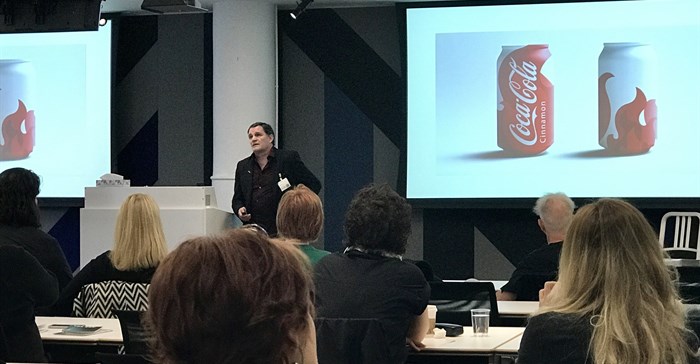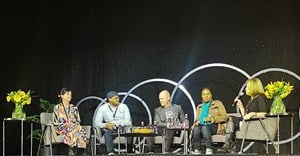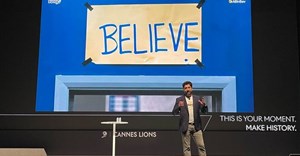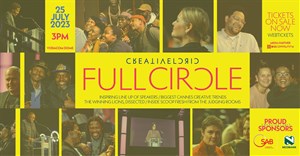Trending
#OneShow2017: Ross Chowles on keeping students' attention

Chowles’ topic was how to keep students’ attention in an attention-deficit age.
 Ross, great talk and it’s nice chatting to you now. Talk to me about how you can retain the attention of students in this age of attention deficit.
Ross, great talk and it’s nice chatting to you now. Talk to me about how you can retain the attention of students in this age of attention deficit.
Let’s first set up the issue. The issue is, everyone is on their cell phones or in their laptops. Just go to a restaurant and you’ll see couples both playing on their phones. It seems we’re all having a conversation with somebody else rather than the person in front of us. In a way, I think it’s less about attention than it is about detachment.
To talk about advertising then –for a marketer, this is the death knell. We are overloaded with all the messaging and tweeting, emails and so on, so actually, our ability to retain a message from a brand – you’re just one of a million messages. So, there’s a problem there. Now you get to a university, where the students not only psychologically have an attention deficit but you also have the way a university works. They’re running from class to class, they’re not focused in one area. It’s not like medicine, where everything they do is helping towards a single goal. They’re learning about ethics, which is great as part of a rounded education, but it doesn’t help in my course, which is to make them the most competent creative people.
 So what are you doing to try and solve this really difficult problem?
So what are you doing to try and solve this really difficult problem?
The traditional way of briefing is that every week, you’d give them a different project. You’d say, “It’s a fast-food outlet, and they’re having a half-price sale and use whatever media you want.” Then, four classes later, you’ll go, “OK, now we’re working on a bank and their new savings account.” So each time they get a new brief they have to understand the brand, they have to come up with a solution and then come up with an idea. They have to learn the craft of each medium, which on the surface sounds great because you’re preparing them for the real world. But actually, it’s not great for teaching, because university is about the intellectualisation of something. So my belief is, the solution is, for the entire semester – from the beginning of my class to the end of it, they pick one brand. They truly understand that brand and then they explore their idea in the various mediums. This allows them, in the time allocated to my class, to focus on coming up with great ideas for a billboard because they don’t have to spend any time understanding a new brand, understanding the strategy and so on – they’ve already done that work. So they’re in a world, they’re in a tone. I think tonal advertising is advertising of the future. So they understand that, then they can come up with the very best idea for that kind of medium.
 How do you go about keeping their attention, even within that scenario?
How do you go about keeping their attention, even within that scenario?
No cell phones or laptops – get them out from out of their desks. I think that’s the key, because a desk is like a laptop – it’s a barrier, a “don’t talk to me.” Rather get them drawing.
 Where do you think the future is going in terms of this real issue of attention deficit?
Where do you think the future is going in terms of this real issue of attention deficit?
It’s been really bugging me for quite a while now – I’m talking the last five years – which we live in an age of information overload. Plus, I know it doesn’t seem this way with the Trumps of the world, but we’re actually living in a more feminine world, which means we’re more intuitive rather than the ‘mansplaining’ world of the 1950s and 1960s, which was very message-orientated.
So people are suffering from information overload and they don’t care about your message. I think that the future of marketing is to make people feel something. You’d say “Of course, we know that, emotional advertising wins,” but I don’t mean that. I mean take a client, let’s say Ford. Ford picks an emotion. They go, “We’re about excitement,” and then all their marketing is about making people feel excited. So if they attach excitement to the brand, they’re in a really strong place.
 Do you think many brands are doing this, currently?
Do you think many brands are doing this, currently?
No, I don’t see anybody doing it in that methodology. I think if you take John Lewis, they do emotional advertising, but they haven’t picked an emotion. They haven’t said, “We’re about envy,” or “We’re about lust,” or “We’re about laughter.” They just make emotional advertising. Now, it’s about leaving a person with a feeling.
 And are you enjoying your new career?
And are you enjoying your new career?
I’m totally out of my comfort zone, and I’m totally loving it.
That’s fantastic Ross, thank you so much.
Visit our One Show special section for the latest updates!


















